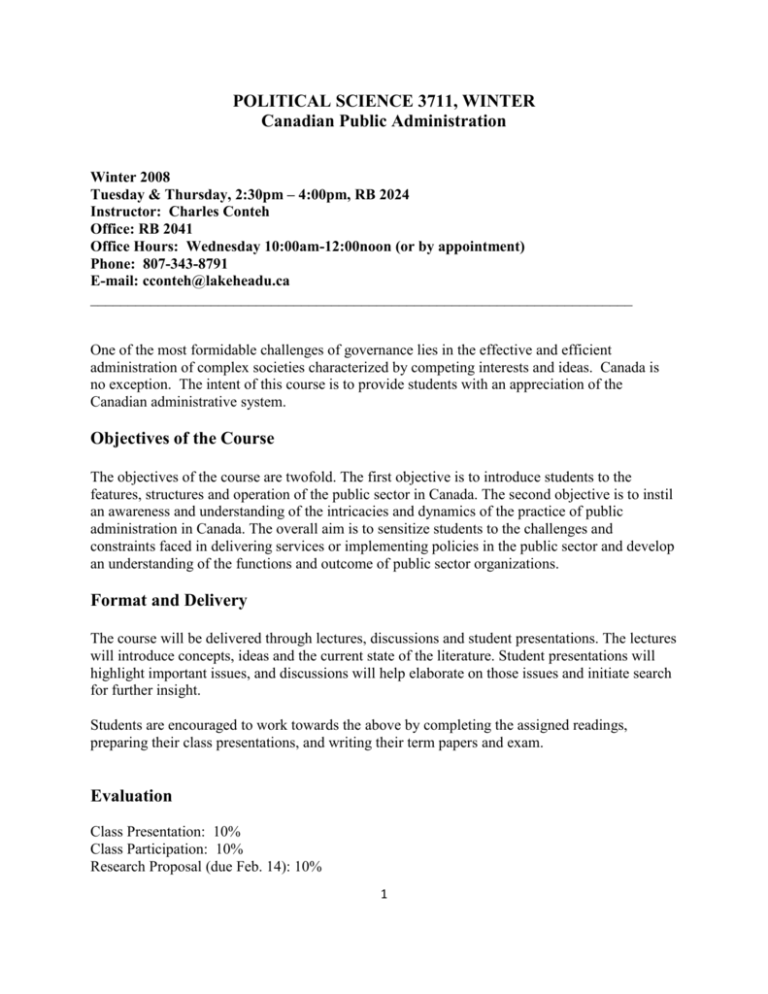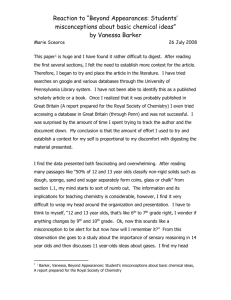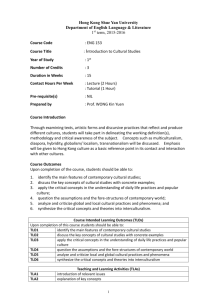Political Science 3711 WA
advertisement

POLITICAL SCIENCE 3711, WINTER Canadian Public Administration Winter 2008 Tuesday & Thursday, 2:30pm – 4:00pm, RB 2024 Instructor: Charles Conteh Office: RB 2041 Office Hours: Wednesday 10:00am-12:00noon (or by appointment) Phone: 807-343-8791 E-mail: cconteh@lakeheadu.ca ________________________________________________________________________ One of the most formidable challenges of governance lies in the effective and efficient administration of complex societies characterized by competing interests and ideas. Canada is no exception. The intent of this course is to provide students with an appreciation of the Canadian administrative system. Objectives of the Course The objectives of the course are twofold. The first objective is to introduce students to the features, structures and operation of the public sector in Canada. The second objective is to instil an awareness and understanding of the intricacies and dynamics of the practice of public administration in Canada. The overall aim is to sensitize students to the challenges and constraints faced in delivering services or implementing policies in the public sector and develop an understanding of the functions and outcome of public sector organizations. Format and Delivery The course will be delivered through lectures, discussions and student presentations. The lectures will introduce concepts, ideas and the current state of the literature. Student presentations will highlight important issues, and discussions will help elaborate on those issues and initiate search for further insight. Students are encouraged to work towards the above by completing the assigned readings, preparing their class presentations, and writing their term papers and exam. Evaluation Class Presentation: 10% Class Participation: 10% Research Proposal (due Feb. 14): 10% 1 Research Paper (due April 1): 30% Final exam (To be scheduled by Registrar): 40% Class Presentation & Participation Starting the second week, you will take turns making a half-hour presentation of the readings. Class presentation consists of leading the class through the assigned readings. This involves focusing the discussion on core concepts and central arguments within the readings, comparing the arguments of different authors, and finally raising questions for a broader discussion. Presenters should not merely present but also facilitate. They should come prepared with questions to steer discussion. Other class participants must arrive in class prepared and having carefully done the readings in order to engage in the discussion launched by the presenters. As a presenter, you should ask the class to: define and clarify the core concepts and terms summarize and discuss the central arguments raise important issues and questions related to the readings discuss the strengths and weaknesses of the readings As a class participant, you should try to answer the questions raised by presenters and other participants, respond to their contributions to seminar discussions, provide information and examples, and raise your own questions and issues. Research Proposal Students should ideally choose topics of interest to them, but must be centred on issues related to public administration in Canada. The Research Proposal is an important step in writing a research paper. It should be between four and five pages in length, including bibliography. You could use the following order: find the books and academic journal articles most relevant to your research topic decide on a project title clearly state your research question define what you seek to explain provide an outline of the project: why you have decided to study this particular issue and what the central themes are review and distinguish different explanations that have been suggested in the literature. Late outlines will be penalized 2 percentage points per day, and will be assigned a mark of zero if handed in two weeks after the due date. 2 Research Paper Essays should be built on the research proposal, and should be between 12-15 pages in length. Late papers will be penalized 2 percentage points per day, and will be assigned a mark of zero if handed in two weeks after due date. Your research paper should be structured well. An example of a good structure would be the following: Introduction Literature Review (Theoretical Framework) Case Study Conclusion Final Exam The final exam gives you an opportunity to demonstrate your understanding of the readings. For the exam, you will be able to use the readings, your seminar preparation documents and your notes. Lakehead Policy on Academic Dishonesty Academic dishonesty consists of misrepresentation by deception or by other fraudulent means and can result in serious consequences. The following illustrates only three forms of academic dishonesty: 1. Plagiarism, e.g. the submission of work that is not one's own or for which other credit has been obtained. 2. Improper collaboration in group work. 3. Copying or using unauthorized aids in tests and examinations. Textbook (Required) Barker, Paul, “Public Administration in Canada,” (Toronto: Thomson & Nelson, 2008) Reserve Text (Case Studies) Case Studies in Canadian Public Administration (Available at Library Reserve Collection) 3 TOPICS AND READINGS With the exception of course textbook, all other readings have been placed on reserve at the library. Please inform the instructor if you have any difficulties obtaining course materials. Section I: Concepts and Notions Week 1 (Jan. 8 & 10): Introduction: Course Overview Understanding Public Administration – A Conceptual Map Paul Barker (textbook), Chap. 1 Week 2: (Jan. 15 & 17) Relating Public Administration to Organizational Theory Barker, Chap. 2 Week 3: (Jan. 22 & 24) Human Agency Amidst Changing Structures Barker, Chaps. 3 & 4 Case Study 3.09: "Change Management" By Marc Leger and John Oxner Case Study 2.15: “Reinventing a Ministry” by Mary Tate Section II: Structures and Institutions of the Public Sector Week 4: (Jan. 29 & 31) Traditional Organs: Government Departments & Central Agencies Barker, Chap. 5 CASE STUDY 1.47:“Innovating at the Provincial Auditor General” By Alisa Giroux Week 5: (Feb. 5 & 7) The State as a “Market”: Crown Corporations Barker, Chap. 6 CASE STUDY 1.16: “Canadian Cellulose Company” By Robert W.Sexty Week 6: (Feb. 12 & 14) Fragmenting the State (?): Independent Regulatory Agencies & Alternative Service Delivery 4 Barker, Chaps. 7 & 8 Case Study 2.19: "Change Management and the Liquor Control Board of Ontario (LCBO) By David Barrows and Arthur Barrows Case Study 4.01: Partners in Postsecondary Success: The University of Guelph-Humber By Ted Glenn Section III: Administering a Liberal Democracy Week 7: (Feb. 19 & 21) Reading Week Week 8: (Feb. 26 & 28) Public Values and Bureaucratic Power Paul Barker, Chaps. 9 & 10 CASE STUDY 1.42: “Illegal Procedure or a good Hand-Off?” By David Siegel CASE STUDY 1.01: “A Conflict of Loyalties” By Kenneth Kernaghan Week 9: (Mar. 4 & 6) Putting Ministers in Charge of a Bureaucratic World Paul Barker, Chaps. 11 & 12 CASE STUDY 1.36: “Four Million Dollar Typo” By Laurence E. St. Laurent and Sandford Borins Week 10: (Mar. 11 & 13): Answering to the Citizenry- Myth or Reality? Barker, Chaps. 13 & 14 CASE STUDY 4.02: Are You Listening? Can You Hear? By Andrew Graham Case Study 1.98: “The Ben Fisher Case” By Nancy Le Pitre, Salim Mansur and Wilbur Grasham Week 11: (Mar. 18 & 20): Administering a Complex Society: Beyond the State Barker, Chaps. 15 & 16 CASE STUDY 1.9: “Allocation of a National Housing Budget” By Barbara Wake Carroll CASE STUDY 1.59 "Negotiating the Native Friendship Centre Program" By G. T. Rayner 5 Section IV: Organizational Resources: The “Oil” of the State Machine Week 12: (Mar. 25 & 27) Managing People in a Public Organization Barker, Chaps. 17 & 18 Case Study 5.01: "Impasse": Team Building By John Hunter CASE STUDY 1.83: “Representative Bureaucracy in Policing” By Barbara Wake Carroll Week 13: (Apr. 1 & 3) Managing the Public Treasury Barker, Chaps. 19 & 20 CASE STUDY 1.56: “Managing Fiscal Restraint” (Simulation) Lloyd Brown-John Week 14: (Apr. 8) Conclusion and Course Review 6








